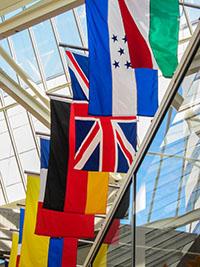Consular Legalization (in lieu of Apostille) by Foreign Embassies/Consulates in Canada

Appostille in Effect in Canada
Hague Convention (Apostille) comes into effect in Canada on January 11, 2024.
Since that date authenticated documents include a standard certificate called an apostille. The apostille eliminates steps required to get documents accepted in countries where the convention is in effect, including the legalization by a consular office of the country of destination. This will simplify and speed up the acceptance of Canadian public documents in the more than 120 countries that have signed the Hague convention 1961. Apostille process also is more time and cost effective than standard consular legalization, as you can save your money for official embassies fees.
Despite apparent simplicity of the Apostille process there are plenty of nuances that depend on the type of the document and country where the document would be used.
Please be advised that standard consular legalization at the embassy (2 steps process) is still needed for documents that originated in Canada if they are used in the countries that do not sign Hague Treaty 1961.
Sometimes superlegalization of Apostille at the embassy is needed.
After the document is notarized in the province and authenticated at Global Affairs of Canada (please see "DFAIT authentication" and "DFAIT Requirements" links), the document can be legalized at a foreign Embassy/Consulate in Canada. Canada Legalization Services© has been working with many foreign Embassies/Consulates for years, and due to accumulated knowledge of their specific requirements, we can efficiently assist you with the legalization of your documents.
Canada Legalization Services© has long-standing working relations with foreign embassies in Canada and USA.
Please note that foreign Embassies/Consulates often require that the documents consisting of more than one page must be properly sealed and bound by Notary Public or Lawyer and/or certified translator. This requirement is to do with fraud prevention or usual practices among their domestic notaries. This frequently creates a confusion as in Canada the common practice is to attach the documents together with a stapled paper corner or grommet (metal or plastic eyelet or ring). As a minimum, foreign Embassies/Consulates can accept the grommets but in certain cases they prefer a special ribbon and seal. Also, laminated documents are not accepted for legalization.
Each case is unique and requires preliminary documents observation and expertise from our side.
The preliminary expertise of your documents will help you to save time and money for couriers.
The nature of our business requires preliminary observation of copies of your documents by email. If you want us to help you, please be prepared to share the scanned copies.
For us to proceed with your consular legalization request, we will need the following:
-
Notarized document authenticated at DFAIT - please note that we can provide DFAIT authentication service as well or you may submit the document already authenticated at DFAIT.
-
Photocopy of the document to be legalized
-
Sometimes, we may need to temporarily have the original document - this will be returned to you after services have been completed. Please contact us in advance to finalize if the original would actually be needed
-
If the document to be authenticated/legalized belongs to a physical person (e.g., copy of the diploma), you need to attach a photocopy of the person's passport.
-
Payment in the form described in our Payment Methods section and amount described in our Fees section. You may make one payment for all the services from us - e.g., if you need both DFAIT authentication and consular legalization.
-
Self-addressed envelope with prepaid airway bill. You can use any courier company but we strongly suggest using FedEx, UPS or DHL for faster return of your documents. If you do not enclose return envelope, we will return your documents via either standard or registered mail Canada Post.
-
It is highly advisable that you contact us in advance prior sending your documents to us to ensure that all requirements are satisfied. We can then agree on the plan for providing our services.
After we agree on the best course of action and deadlines, you would need to arrange shipping of your documents to our Ottawa office (address below in the footer). As for courier company of your choice, you can use FEDEX, DHL, UPS, TNT, Purolator, Canada Post or any other reputable company. However, based on our long experience, we highly recommend using FedEx, DHL or UPS due to their better service quality and overall delivery terms. For example, their express services often deliver either before 10:00am or noon next business day for in-Canada shipments as oppose to Purolator/CanadaPost who may deliver after 1-2 days before 17:00.
After you ship you documents, you are requested to notify our representative by e-mail or telephone and provide the tracking # so that we can keep you updated regarding the receipt, progress reports and confirmation of completion of our services. After we receive your documents and review them, we will confirm the expected date of completion. After that you can relax, and let us do our job!
Canada Legalization Services© will then start fulfilling your order, and we will deliver to your full satisfaction!
